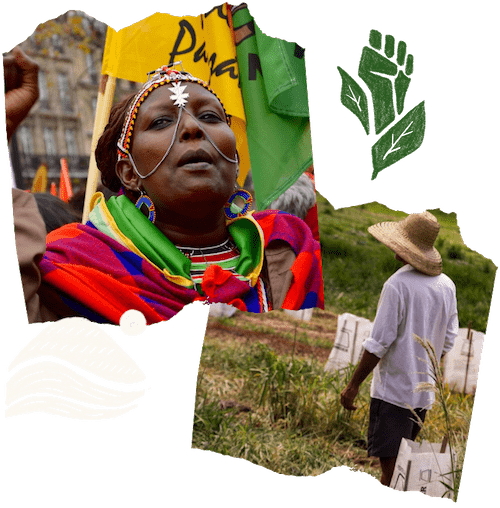Why Grassroots Action Works
Reimagining philanthropy by funding what works.
Introduction
Why do we fund social movements? Because grassroots solutions work.
Too often, mainstream responses to today’s problems rely on the same practices that got us here — those steeped in relentless extraction of the natural world and of people’s labor. But in an age of pandemic, climate chaos, and ever widening inequality, transformative change is essential to our collective survival.
Social movements, organized collectively by those most impacted by systems of oppression are leading this change. They see the root causes of injustice, envision solutions, and take actions to make their visions a reality.
In the process, they are accomplishing the seemingly impossible:

Collectively planting tens of millions of trees across Haiti’s central plateau against a backdrop of political instability, economic crisis, and climate-induced disasters, to achieve countless social and ecological benefits.

Reclaiming 7.5 million acres of land by and for landless workers in Brazil, a country with some of the world’s highest levels of land tenure, and overall, inequality.

Elevating food sovereignty, a concept originating from peasant movements, to policies and legal frameworks at the municipal, national, and international levels — and shifting global agrifood policy debates in the process.

Blocking extractive megaprojects like the Agua Zarca dam that threatened the vital watershed and ancestral territory of the Lenca people of Honduras.
Grassroots movements are not only imagining a new world, but actively bringing it into being in the here and now.
They are operating in the cracks of existing systems and simultaneously building the new as they work to dismantle the old.
Grassroots activists are strategic systems thinkers.
They are intersectional in their politics, intergenerational and collective in their leadership, and adept at working across multiple scales.
Frontline movements carry out their work at great risk.
Frontline activists face a host of threats, sometimes to their very existence, because they represent a threat to the powers that be.
Despite the huge potential impact of funding at the grassroots level, currently only 1% of international giving from U.S. foundations is for general support to local organizations. Increasingly driven by speed and scale, traditional philanthropy is overlooking the systemic solutions being presented by grassroots movements. If a new world is possible, then a new philanthropy must be possible too. Philanthropy must face hard truths in order to decolonize itself from within while practicing a radical redistribution of funds to the frontlines of global struggles.
We are reimagining philanthropy while providing critical support to the most vital and effective social movements of our time. We have refined our approach — what we call solidarity philanthropy — over four decades of social movement accompaniment. We hope you will join us.
Donate today
Join our community of donors who support grassroots social movements.


“Through Grassroots, we have learned how international aid has often worked against the interests and rights of Indigenous Peoples. We have seen abundant evidence of creative and courageous people standing up for their rights, but without international support and advocacy, their voices don’t carry very far.”
Jim Graham, Donor
